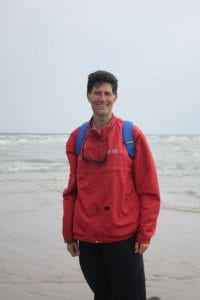PhD Student
Department of Earth and Planetary Sciences
Research interests: urban coastal hydrogeology, sea levelrise (SLR) impacts, SLR risks to wastewaterinfrastructure, Quaternary geomorphology, publicinfrastructure economics and policy
Biography
I started as a geology technician at the U.S. Bureau of Mines Coal Research Station in Bruceton, Pennsylvania and after a master’s degree in geology, I worked as an oil exploration geologist on the North Slope of Alaska and in California. I co-own and operate Clearwater Group, an environmental consulting and contracting company. I strongly believe in public service. Since 2003, when I was elected as a director of a community services district with 47 km (29 miles) of sewer pipelines and a commissioner of a 0.11 million m3/d (2.90 million gallons per day) dry weather flow capacity wastewater treatment plant, the boards have prioritized maintenance of their respective urban wastewater infrastructure. I received Fulbright awards to teach workshops on subsurface sampling methods and remediation of environmental contamination. I am a Fellow of the National Ground Water Association and the Geological Society (of London) and active in a variety of professional organizations, including the American Institute of Professional Geologists (AIPG), National Ground Water Association (NGWA), American Association of Petroleum Geologists (AAPG), ASTM International (ASTM), Association for the Environmental Sciences and Health (AEHS), and the Groundwater Resources Association of California (GRAC).
Research
Rising sea level, extreme storms, exceptionally high tides, groundwater emergence and land subsidence are a few of the flood factors impacting coastal urban wastewater treatment plants and sewer collection systems, causing sewage overflows. Sewage overflows create human exposure health risks and cause environmental damage. Climate change has increased the intensity of the various types of flooding. The result is increasing wastewater system operations costs. And the high salinity significantly reduces water recycling opportunities. In my Ph.D. work I plan to collect real-time water elevation, conductivity, and temperature data from within sewers and in wells and piezometers in preferential pathways and regionally, as well as in tide, stream, and rain gauges in representative coastal urban communities in northern California. The collected field data along with historic information will be evaluated using statistical models and Bayesian decision analysis tools. This will allow agencies to make better choices on 30-year infrastructure plans where flood outcomes and sea level rise cannot be predicted with certainty. The primary benefits of the study will accrue to the wastewater agencies and their rate payers. A secondary benefit will be real-time flood hazard data which can be provided through social media and government agency websites to notify emergency workers and the public of impending floods and flooding conditions.
